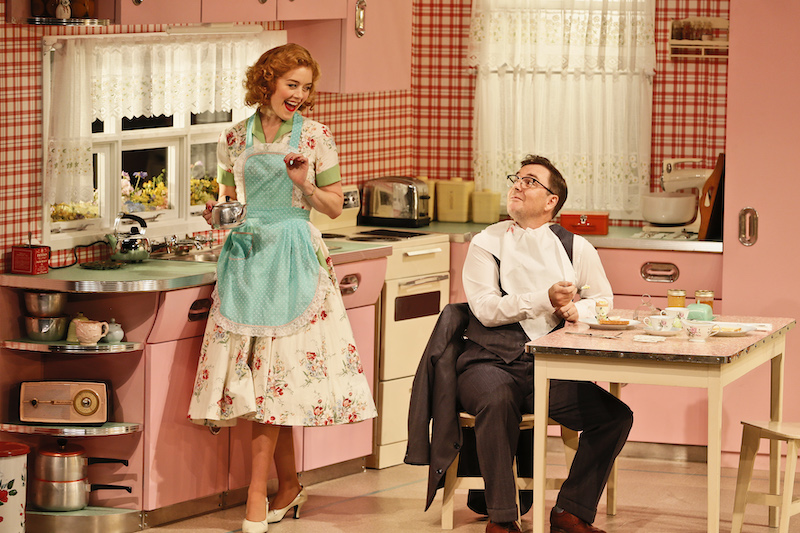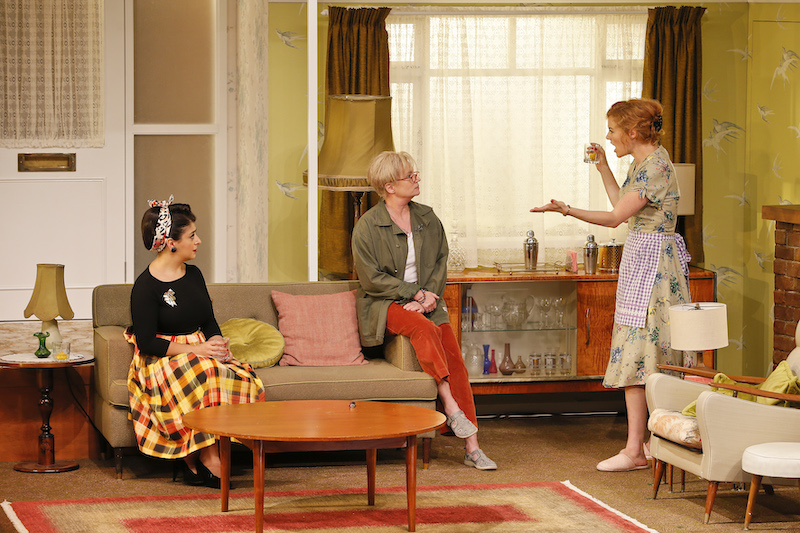Fresh from success in the UK, Laura Wade’s satire Home, I’m Darling opens Melbourne Theatre Company’s 2020 season with a swirl of 1950s skirts and dollhouse-perfect domesticity. It looks fab, leading lady Nikki Shiels is a treat, and the script is a clever confection, but ultimately Wade’s exploration of gender roles, feminism and identity feels like a veneer of retro Formica laminate.
 Nikki Shiels and Toby Truslove. Photograph © Jeff Busby
Nikki Shiels and Toby Truslove. Photograph © Jeff Busby
Shiels plays Judy, who we first meet as she literally dances through breakfast preparations in heels, full skirt and frilly little apron, while husband Johnny completes his own classic 1950s look upstairs. In this dumbshow of post-war domestic bliss, the English couple are surrounded by everything from 50s furniture and appliances to music. It’s beautiful to watch, and gently tickles the funny bone as if to say with a wink and a nudge, “yes, of course this is too good to be true”.
After they declare how outrageously happy they are over breakfast, and Johnny goes to work with trilby, coat and a lunch lovingly packed by Judy, we discover just how unreal it all is. Unfortunately there’s no way to review Home, I’m Darling without giving away its fun but short-lived conceit. Judy and Johnny are actually living in the here and now, but so obsessed with the 1950s that they are trying to live in a nostalgic bubble – Judy in particular, who has quit her job and joined the Cult of Domesticity with gracious gusto.
After the initially anachronistic appearance of a laptop, the grand facade continues to crack, despite all the Instagram-ideal vintage dresses, tea sets, cakes, cocktails and hors d’oeuvres Judy works so hard to perfect. Fellow 50s-loving friends Fran and Marcus visit looking the part, but a mobile phone soon appears, and Fran, who has a job she enjoys, is not afraid to admit she’s no Domestic Goddess. Judy’s mother Sylvia also drops by in contemporary, if slightly frumpy feminist-hippy attire, and Johnny’s female boos, Alex, is pure 21st century.
It’s what’s said – and not said – that really makes the 50s fantasy shake, however. Fran’s observation about the era being far from cool for anyone who wasn’t white and heterosexual is just the hors d’oeuvres to Sylvia’s angry, incredulous main course about how awful living in 1950s England actually was, and that Judy’s chosen lifestyle is a renunciation of hard-won feminist gains. Eventually there’s even a sour little dessert of Mad Men-style sexual harassment.
As these rather obvious criticisms of the era are ticked off, initially unspoken problems with Judy and Johnny’s fantasy-driven relationship, and why Judy tries so hard to be the ideal 1950s housewife, suggest a more interesting, nuanced line of thought about contemporary life is emerging. All we get in the end is a simplistic compromise, as sweet as one of Judy’s pretty cakes.

Susie Youssef, Jane Turner and Nikki Shiels. Photograph © Jeff Busby
Director Sarah Goodes and the cast make the most of the script’s humour, which, together with Renée Mulder’s set and costumes, is almost enough to jolly us along without questioning the substance too much. Shiels’ light-footed perfectionism is vintage-sitcom funny, with an underlying fragility she can only take so far given the material. Toby Truslove is in his quietly funny element as Johnny, but neither he nor Shiels can persuade us the couple’s attempts to resolve their problems around the retro kitchen table have much substance.
Jane Turner dials down her renowned comic abilities as Sylvia who, apart from the occasional sardonic comment, is almost the straight woman of the piece. She delivers that angry monologue with conviction, but it’s surrounded by so much enjoyable fluff that I for one was not entirely convinced. As Fran, Susie Youssef’s ironic tone and facial expressions are in delicious contrast to the 50s perfection of her clothes, hair and make-up, while Peter Paltos slowly reveals how Marcus isn’t quite what he seems. Izabella Yena is spot on with her portrayal of strong, matter-of-fact modern woman, Alex.
The set is an homage to 1950s design, with cleverly concealed and semi-concealed ways of making the physical realities of domestic bliss (such as dirty dishes and a change of outfit) move seamlessly between stage and backstage. Handsomely lit by Paul Jackson, the set is clearly inspired by a doll’s house, but this means the main kitchen/living area is topped with a barely used bedroom and bathroom above.
As the title suggests, Home, I’m Darling gives the happy 1950s cliché a good shake and reshapes it into a contemporary satire. It’s fun and gently thought-provoking, but ultimately feels like a great idea squandered.
Home, I’m Darling plays at the Sumner Theatre, Melbourne until February 29











Comments
Log in to join the conversation.